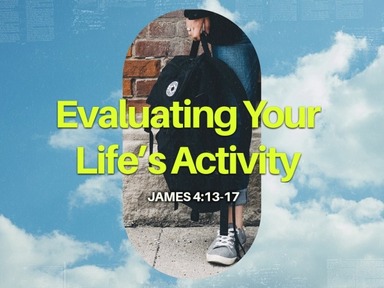Evaluating Your Life’s Activity

Evaluating Your Life's Activity
Introduction
Main Principle: Life is short—stop living self-sufficiently and trust God!
I. The picture of our self-sufficient attitude, 13.
For James, the fatal defect in their planning is their presumptuous self-centeredness, resulting in the effective exclusion of God from the practical affairs of their daily lives. p 252 They were guilty of living a life of practical atheism.
II. The arrogance of our self-sufficient attitude, 14.
III. The acknowledgment of a God-sufficient attitude, 15.
This world is not a closed system; what appears to our senses to be the totality of existence is in fact only part of the whole. This life cannot properly be understood without considering the spiritual realm, a realm that impinges on and ultimately determines the material realm in which we live day to day. Of course, such a worldview is not specifically Christian. Few of the people who lived in James’s day would have been agnostic or atheistic; most recognized the existence of some form of divine being. And so it is not surprising that phrases such as “if God wills” (Latin Deo volente) or “if the gods will” are found in many kinds of ancient literature.44
James thus makes the continuance of life itself contingent on the will of the Lord.
IV. The wickedness of our self-sufficient attitude, 16-17.
James is rebuking not people of the world but Christians. He warns, therefore, of the tendency of the world to “press us into its mold” by leading us, perhaps very subtly, to begin assuming that we control the duration and direction of our lives. Such an attitude is simply inconsistent with a Christian worldview in which there is a God who sovereignly directs the course of human affairs.
He has urged us to take the Lord into consideration in all our planning. We therefore have no excuse in this matter: we know what we are to do. To fail now to do it, James wants to make clear, is sin. We cannot take refuge in the plea that we have done nothing positively wrong. As Scripture makes abundantly clear, sins of omission are as real and serious as sins of commission. The servant in Jesus’ parable who fails to use the money he was entrusted with (Luke 19:11–27); the people who fail to care for the outcasts of society (Matt. 25:31–46)—they are condemned for what they failed to do.
For we have a tendency, when we think of sin, to think only of those things we have done that we should not have done. I know my own confessions before the Lord tend to focus on these kinds of sins. But I should also consider those ways in which I have failed to do what the Lord has commanded me to do. Perhaps I did not reach out to help a “neighbor” in need; or perhaps I failed to bear witness to a co-worker when I had the opportunity. These also are sins for which I must seek God’s forgiveness.47